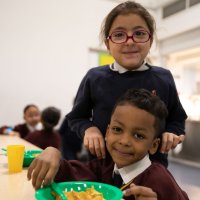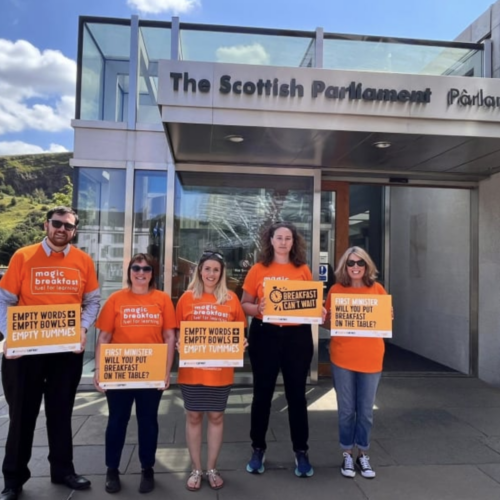This week is London Challenge Poverty week. Despite the capital being one of the regions with the highest concentration of wealth in the UK and an economy that grew during the pandemic, London has historically been the region in the UK with the highest poverty levels. 700,000 children live in poverty in London. To bring together voices in the sector to tackle this issue, The Childhood Trust together with the London Child Poverty Alliance each year host the London Child Poverty Summit.
At this year’s event Magic Breakfast were excited to hear from a wide range of experts on child poverty. We were worried to learn that London has the highest proportion of children and young people living in poverty who are not eligible for free school meals. Living in poverty has detrimental impact on mental wellbeing and the Centre for Mental Health highlighted the causal link between economic disadvantage and mental illness. Hearing directly from young people on their experiences of exclusion from their own city and communities due to the lived experience of poverty served as a timely reminder of the challenging situation many disadvantaged children and young people now find themselves in.
This conversation was particularly timely given the impact rising costs and high inflation, especially in relation to basic food items, will have on the schools, families and children we support in London and beyond. According to a Survey of Londoners, published by the Mayor of London, 1.2 million (16 per cent) adults in London had low or very low food insecurity in 2021/22, and around one in seven (14 per cent) parents had children living in food insecurity.
Magic Breakfast currently support 230 schools in London which allows us to reach approximately 47,000 children and young people each school day. In Magic Breakfast’s London partner schools, 81% of schools believe that child hunger has increased in their community in the last year and 90% believe poverty has increased. 96% of schools cited that this was being driven by the current cost-of-living crisis and 67% cited the pandemic. This shows the precarious situation the families we support find themselves in, coming out of the pandemic only to face similar financial challenges with the current cost-of-living crisis.
A student is from a family of five children and two adults, all of whom with Special Needs. Dad was on a zero-hour contract and his job was terminated during the pandemic, so the family relies on Universal Credit and food bank vouchers. Money is tight, especially with the current cost-of-living crisis.
Magic Breakfast Partner School, London
We know the impact our intervention has in the communities we support, easing the pressure of rising costs with 91% of Magic Breakfast partner schools in London believing that our breakfast provision has a positive impact on alleviating pressure on families’ budgets and 59% believing that it facilitates parents’ access to work. With the cost-of-living crisis pulling more families into poverty and food insecurity, it has never been more important to ensure that no child is too hungry to learn.






